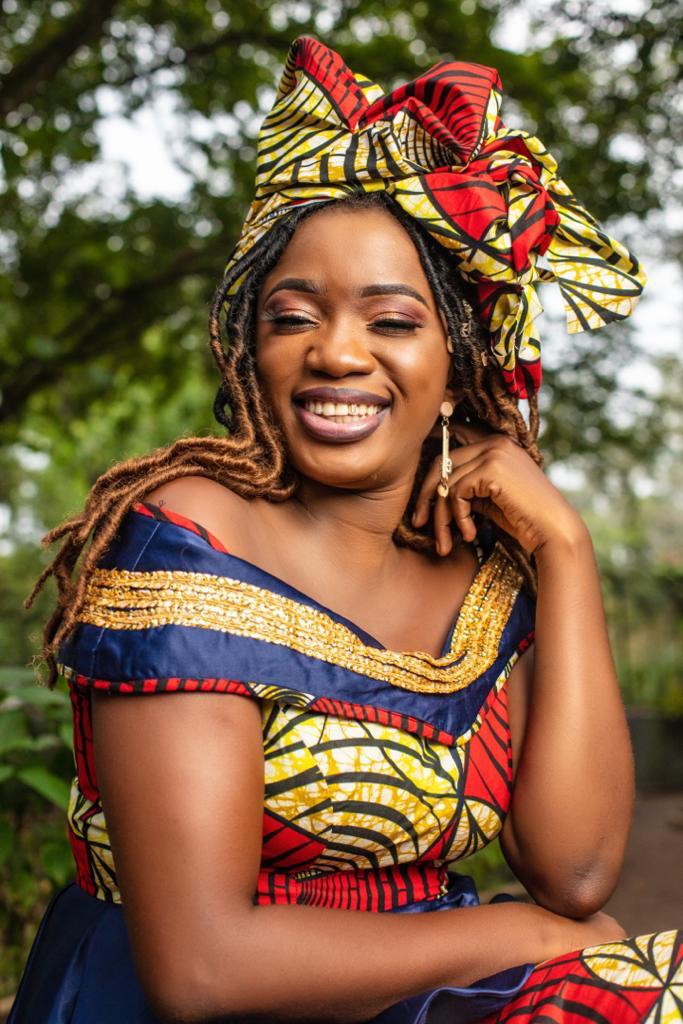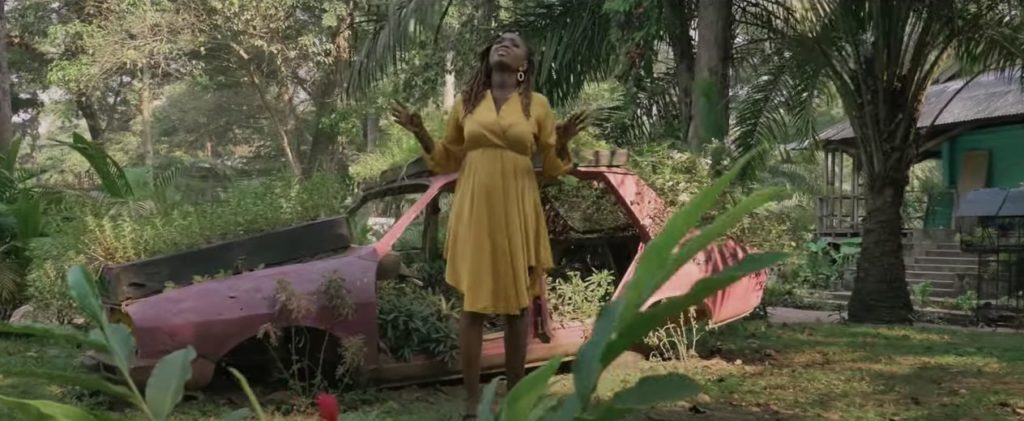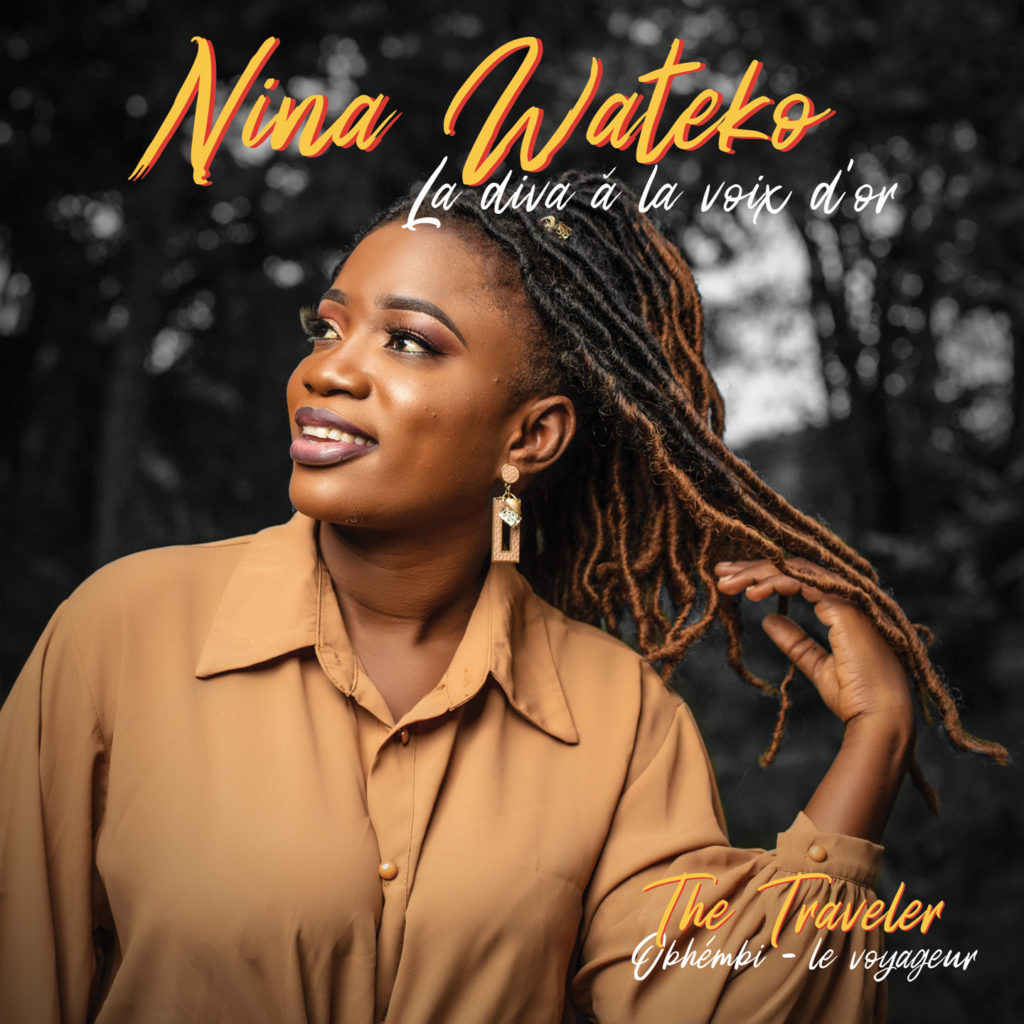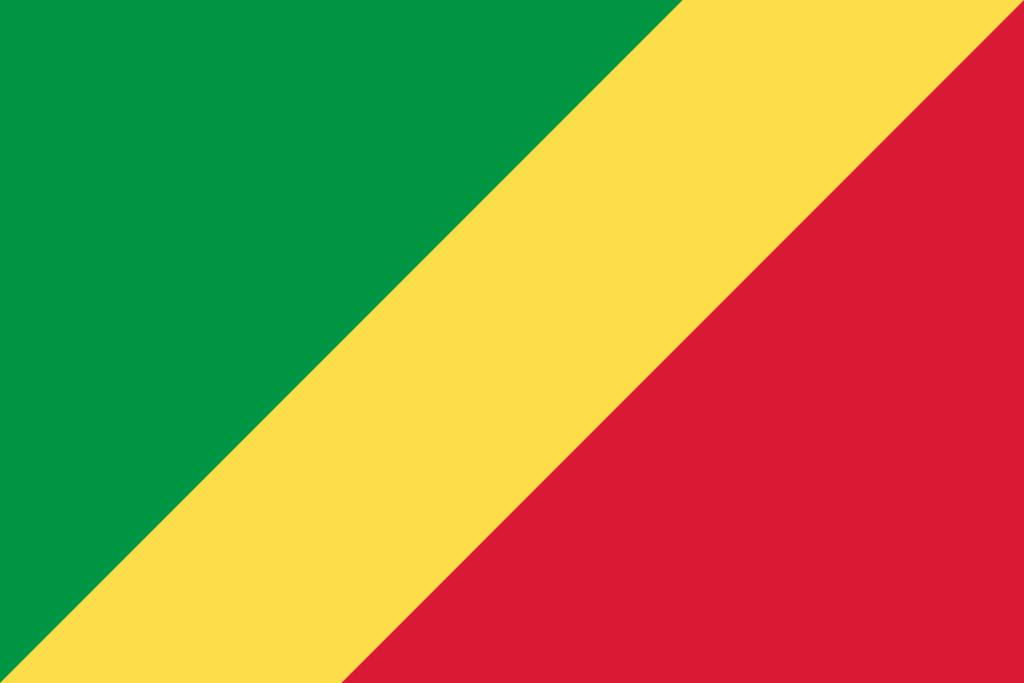
Nina Wateko -From Congo Brazzaville to the World_Interview_fr/engl/ger
Von Hans Hofele
Es ist ein eher ruhiges Stück, das einen in den Bann zieht. The Traveler von Nina Wateko ist so wunderbar jazzig, afro-jazzig, dass man ihr auf diese Reise folgt. Im Video ist die Reise vielleicht nur ein Traum, eine Imagination vom Verlassen werden auch, von Hoffnung. Sie singt auf Mbochi, einer Sprache ihrer Heimat Congo-Brazzaville und selbst wenn man es nicht versteht, versteht man es dennoch. Das ist die Magie. Und das liegt an dieser Stimme: Sie hat viel Melancholie im Timbre, etwas zerbrechlich manchmal aber auch eruptiv.
for french and english please scroll down
Nina Wateko, die Sängerin mit der goldenen Stimme ist in ihrer Heimat schon ein Star. Ist in den Medien, im Fernsehen, Radio ein gern gesehener Gast. Und sie hat in Brazzaville schon Titel bekommen, auf die andre Künstler länger warten müssen. Die “Diva” wird sie genannt oder auch “Mama Africa”. Ihre Heimat ist Kongo-Brazzaville im westlichen Zentalafrika. Nachbar des großen DR Kongo. Nina stammt aus eine Musikerfamilie; ihre Mutter ist ebenfalls Sängerin, mit Musik ist sie aufgewachsen. Mit “The Traveler”, ihrer neuen EP und der ganzen Bandbreite ihres musikalischen Könnens wird sie demnächst auch die westlichen ZuhörerInnen in Europa verzaubern. Cultureafrica hat mit Nina gesprochen.

Ich wollte von Nina wissen, ob sie sich auf bestimmte Musikstile festlegt oder eher auf eine Verschmelzung der Stile setzt, ob sie auch Neues ausprobiert?
Sie wissen, dass die Welt heute seit einiger Zeit zu einem globalen Dorf geworden ist. Und die Offenheit für andere Völker ist größer geworden: für Sitten und Bräuche, für Gesang und Musik geschieht automatisch. Ganz normal: ich hatte schon immer eine besondere Aufmerksamkeit und Interesse, für Musik, für andere Klänge von anderswo. Auch darum geht es in dem Stück: ich wollte einen Mix kreiren. Deshalb habe ich meine EP “The Traveler” betitelt, was ins Französische übersetzt “le voyageur” bedeutet. Ich wollte meinen Fans die musikalischen Farben schon im Titel ankündigen, darum, worum es geht. Zumal ich diese Melodie in “MBOCHI”, einer Sprache von Nordkongo-Brazzaville, singe.
In ihrer EP Traveler höre ich auch Anklänge von portugiesischem Fado oder Exilos aus Südamerika, woher kommt die Melancholie, die du dort interpretierst?
Die Menschen in Lateinamerika vermischen sich mit den Menschen von anderswo, durch erzwungene Einwanderung wie die Verschleppung von Afrikanern nach Amerika. Sie verließen Afrika mit ihren Körpern, ihrer Kultur, ihrem Gesang und ihrer Musik. Es ist also nur zu unserem Vorteil, daß ich die musikalische Originalität der afrikanischen Quelle, Mutter Erde, in meine Musik bringe, das hört sich in Südamerika vielleicht ähnlich an.
Der Reisende /Le voyageur oder Obhémbi in der Mbochi-Sprache von Kongo-Brazzaville handelt von einem Inkognito-Treffen zwischen einer Frau und einem Mann, die zu einem unbekannten Ziel reisen. Aus dieser zufälligen Begegnung entsteht die Liebe auf den ersten Blick. Ihre Herzen sprechen lauter. Die Zeit steht still. Und schon sieht die Frau, wie ihr das Herz aufgeht, als der Fremde sich entfernt. Da sie nicht die Kraft hat, ihr Herz zu erobern, ist sie überrascht, dass dieses seltsame, subversive, betörende Gefühl in ihr entsteht, das sie dazu bringt, sich unwiderstehlich dem Fremden zuzuwenden, der sich immer weiter entfernt. Wer ist dieser “ruba-cuore”, wie die Italiener sagen? Mit anderen Worten: Wer ist dieser Herzensdieb? Zwischen den beiden Liebenden hat es nie einen Wortwechsel gegeben. Sie sahen sich einfach an, und der Funke entfachte ein Feuer in ihren Herzen, ein Gefühlschaos, das nur die Liebe birgt.”

Nina Wateko ist im Nordosten von Kongo-Brazzaville aufgewachsen. Mit 12 hat sie mit Singen angefangen, in Musikgruppen und Chören, Gospel und Afromusic waren die Stile. Die besondere Stimme durfte Nina im örtlichen Kirchchor üben. Diese Erfahrung will sie gar nicht missen, sie ist sogar heute noch in einem Chor in Brazzaville aktiv:
“Chor- und Chorgesang sind Teil meiner musikalischen und künstlerischen Sache. Bis heute singe ich im Chor meiner Pfarrei im Heiligen Gregor von Massengo in Brazzaville. Zu Hause gibt es immer noch viele junge Leute, die kommen, um in den Chören zu singen. Das finde ich toll und macht mich stolz, dass die Jüngeren daran noch Gefallen finden..
Aber wenn wir über meine Kindheit sprechen: Seit meiner frühen Kindheit bin ich von Rhythmus und Gesang verwöhnt, ich wurde mit dem Virus der Musik in mir geboren, wenn ich das so sagen darf. Singen ist meine Religion und Singen ist mein Gebiet.
Im Alter von 12 Jahren, begann ich zu singen: das Singen zu einem Teil meines Lebens und meiner Existenz zu machen, das war immer mein Ziel. Meine ersten künstlerischen Schritte begannen in einer Unterhaltungsgruppe, deren Musikstil aus Gospel und Afro-Jazz bestand.
Mit der Kraft dieser Erfahrung gründete ich 2009 mit meinen Freunden eine Musikgruppe namens Echos des Anges”. Diese Musikgruppe zeichnete sich durch musikalische Interpretationen aller Genres aus.”
Wie sie das dörfliche Leben auf dem Land in ihrem “kleinen Dorf”, sie geprägt haben, frage ich sie, bekomme aber eine entrüstete Antwort:
“Der Mensch ist das Produkt seiner Herkunft, seines Biotops sozusagen. Aber zur Klarstellung und zu deiner Information: Saint Benoit -Boundji ist vielleicht keine Großstadt aber kein kleines Dorf. Saint Benoit Boundji ist eher eine städtische Gemeinde mittlerer Größe. Dieses kleinen Städtchen ist moderner als viele andere Dörfer im Kongo. Ja, meine Musik hat einen folk-rhythmischen Hintergrund von zu Hause. Meine Musik basiert auf einem Folk- und Rumba-Hintergrund und öffnet sich dann aber auch für andere Sounds der Weltmusik.”

Beschreiben Sie den Lesern die kongolesische Musiklandschaft, ist dort alles Rumba? Wie wichtig ist Dir Musik und wie sehr wird sie geschätzt?
“Die musikalisch-künstlerische Landschaft von Congo Brazzaville hat die Rumba als musikalische Basis. Die Rumba ist ein gemeinsames Erbe im Bereich der kongolesischen Schale, die vom Volk unseres Landes stammt, bevor sie wegen des Exports von Afrikanern in diese neue Welt mittels Dreieckshandel nach Kuba ging.
Rumba als Grundlage der kongolesischen Musik hat ihre Wurzeln in den drei Ländern, die einst das Königreich Kongo bildeten: Angola, Kongo Brazzaville und die Demokratische Republik Kongo, ehemals Zaire. Musikalisch gibt es keinen Unterschied zwischen der Rumba, die in diesem geografischen Gebiet gespielt wird. Es wird aber in Lingala gesungen, unserer gemeinsamen Sprache des Austauschs.
Musik ist für mich das Leben. Ich wurde von meinen Eltern in die Musik hineingeboren meine Eltern waren so musikalisch, ich lebe mit Musik: Musik ist meine Religion, Singen ist mein Bereich und die Musik, ich kann sagen: ich habe sie im Blut.”
Du hast eine sehr schöne natürliche Stimme. Wie singt es sich in einem Umfeld, das von verzerrten AutoTune Stimmen beherrscht wird?
“Musikparadigmen entwickeln sich im gleichen Tempo wie Technologie. Da dies neuerdings der Fall ist, beginne ich damit, diejenigen zu respektieren, die den AutoTune verwenden. Was mich betrifft, so preise ich Gott, dass er mir mit meiner Stimme ein Musikinstrument gegeben hat, die kein AutoTune braucht. Es ist eine natürlich ausgebildete Stimme.”
Nina tritt auf vielen Konzerten und Festivals in Kongo-Brazzaville und in der Nachbarregion auf. Für ihre Konzerte variiert sie die Anzahl der begleiteten Musikanten:
“Ja, ich habe eine Gruppe von insgesamt sieben Personen. Die Anzahl der Musiker, die reisen, hängt davon ab, welchen Konzertstil ich machen werde. Daher habe ich drei Formeln von Szenarios, also auch die Formation: Jede Formel entspricht dem, was wir dem Publikum musikalisch präsentieren werden.”
Doch immer steht ihr ganz konkreter Einsatz, die ihrer Musiker und der Technik da. Es gibt viele Menschen, natürlich junge Leute, die wollen oder können nicht für Musik bezahlen und hören alles auf youtube. Gibt es überhaupt noch Möglichkeiten, außerhalb von Konzerten mit Musik seinen Lebensunterhalt zu verdienen frage ich sie?
“Nein, nicht so viele. Die Menschen, vor allem junge Leute, die die Platten nicht im Plattenladen kaufen können, bevorzugen es, auf der YouTube-Plattform kostenlos Musik zu hören. Die haben sich daran gewöhnt alles kostenlos to bekommen. Und es wird dadurch für den Künstler fast unmöglich, von seiner eigenen Musik zu leben. Das einzige, was uns heute noch bleibt, ist, viel auf Festivals und Konzerten in Europa zu touren. Leider müssten Sie dazu ein ganzes Team dabei haben, es wird dadurch nicht günstiger: Einen Pressesprecher, einen Booking Agent der uns für Konzerteund Festivals bucht und einen Tour Manager. Ansonsten wird es echt schwer. Nur so kann ich in der Musikwelt überleben: durch die Förderung und Sichtbarkeit meiner Musik durch Tourneen und Festivals auf der ganzen Welt, insbesondere in Europa für die Verbreitung meiner Botschaft in meinem Jazzstil und Weltmusik.”
Für das kommende Jahr will sich Nina Wateko noch mehr auf die Reise machen, sie will Kozerte in Europa geben und auf Festivals spielen. Sie wird dann selbst zum Traveller. Bon Voyage!
Nina Wateko live: am 19.11. in Paris und am 27.11. in Wattrelos/Lille, Frankreich.
Für diejenigen, die Nina Wateko für ein musikalisches Projekt/Konzert kontaktieren möchten:
- Telefon : 0033 7 51299717
- E-Mail : jelondabare@yahoo.fr
- AufFacebook, Instagram, YouTube, LinkedIn und Twitter: Nina wateko
 Français
Français
C’est une pièce plutôt calme qui vous attire. The Traveler de Nina Wateko est si merveilleusement jazzy, afro-jazzy, que vous la suivez dans ce voyage. Dans la vidéo, le voyage n’est peut-être qu’un rêve, une imagination d’être abandonné aussi, d’espoir. Elle chante en mbochi, une langue de son Congo-Brazzaville natal, et même si vous ne la comprenez pas, vous la comprenez quand même. C’est ça la magie. Et c’est à cause de cette voix : elle a beaucoup de mélancolie dans son timbre, un peu fragile parfois mais aussi éruptive.
Nina Wateko, la chanteuse à la voix d’or, est déjà une star dans son pays. Elle est une invitée de choix dans les médias, à la télévision et à la radio. Et elle a déjà reçu à Brazzaville des titres que d’autres artistes doivent attendre plus longtemps. On l’appelle la “Diva” ou “Mama Africa”. Elle est originaire du Congo-Brazzaville, en Afrique centrale occidentale. Voisin de la grande RD Congo. Nina vient d’une famille de musiciens ; sa mère est également chanteuse, elle a grandi avec la musique. Avec “The Traveler”, son nouvel EP et toute l’étendue de ses compétences musicales, elle souhaite enchanter les auditeurs occidentaux en Europe prochainement. Cultureafrica s’est entretenu avec Nina.

Je voulais savoir si Nina s’attache à certains styles musicaux ou plutôt à une fusion de styles, si elle essaie aussi de nouvelles choses ?
“Vous savez que le monde est devenu un village global depuis quelque temps déjà. Et l’ouverture aux autres peuples est devenue plus grande : aux coutumes et aux traditions, au chant et à la musique se produit automatiquement. Tout à fait normal : j’ai toujours eu une attention et un intérêt particuliers, pour la musique, pour les sons venus d’ailleurs. C’est aussi le but de la pièce : je voulais créer un mélange. C’est pourquoi j’ai intitulé mon EP “The Traveler”, qui, traduit en français, signifie “le voyageur”. Je voulais annoncer les couleurs musicales à mes fans déjà dans le titre, c’est de cela qu’il s’agit. D’autant plus que je chante cette mélodie en “MBOCHI”, une langue du nord du Congo-Brazzaville.”
Dans votre EP Traveler, j’entends aussi des échos du fado portugais ou des exilés d’Amérique du Sud, d’où vient la mélancolie que vous y interprétez ?
“Les gens d’Amérique latine se mélangent avec des gens d’ailleurs, par le biais de l’immigration forcée comme la déportation des Africains en Amérique. Ils ont quitté l’Afrique avec leur corps, leur culture, leur chant et leur musique. Ce n’est donc qu’à notre avantage que j’apporte l’originalité musicale de la source africaine, la Terre Mère, dans ma musique, qui peut sembler similaire en Amérique du Sud.
The Traveller /Le voyageur ou Obhémbi en langue Mbochi du Congo-Brazzaville est l’histoire d’une rencontre incognito entre une femme et un homme qui se rendent vers une destination inconnue. De cette rencontre fortuite naît le coup de foudre. Leurs cœurs parlent plus fort. Le temps s’arrête. Et déjà la femme voit son cœur s’envoler lorsque l’étranger s’en va. N’ayant pas la force de conquérir son cœur, elle est surprise de voir naître en elle ce sentiment étrange, subversif, séduisant, qui la fait se tourner irrésistiblement vers l’inconnu alors qu’il s’éloigne de plus en plus. Qui est ce “ruba-cuore”, comme disent les Italiens ? En d’autres termes : Qui est ce voleur de cœurs ? Il n’y a jamais eu d’échange de mots entre les deux amants. Ils se sont simplement regardés et l’étincelle a allumé un feu dans leur cœur, un chaos émotionnel que seul l’amour peut contenir.”
Je leur demande comment la vie dans leur “petit village” les a façonnés, mais ils me répondent avec indignation :
“L’homme est le produit de ses origines, son biotope, pour ainsi dire. Mais pour clarifier et pour votre information : Saint Benoit -Boundji n’est peut-être pas une grande ville mais ce n’est pas un petit village. Saint Benoit-Boundji est plutôt une communauté urbaine de taille moyenne. Cette petite ville est plus moderne que beaucoup d’autres villages du Congo. Oui, ma musique a un fond de rythmique folklorique de chez moi. Ma musique est basée sur un fond de folk et de rumba mais s’ouvre ensuite à d’autres sons de la musique du monde.”
Décrivez le paysage musical congolais aux lecteurs, n’y a-t-il que de la rumba là-bas ? Quelle est l’importance de la musique pour vous et dans quelle mesure est-elle appréciée ?
“Le paysage musical-artistique du Congo Brazzaville a pour base musicale la rumba. La rumba est un héritage commun au bol congolais, qui est venu des gens de notre pays avant d’aller à Cuba à cause de l’exportation des Africains vers ce nouveau monde par le commerce triangulaire.
La rumba, base de la musique congolaise, trouve ses racines dans les trois pays qui formaient autrefois le Royaume du Congo : Angola, Congo Brazzaville et République démocratique du Congo, anciennement Zaïre. Musicalement, il n’y a pas de différence entre la rumba jouée dans cette zone géographique. Mais elle est chantée en lingala, notre langue commune d’échange.

La musique est la vie pour moi. Je suis née dans la musique par mes parents ; mes parents étaient tellement musicaux, je vis avec la musique : la musique est ma religion, le chant est mon domaine et la musique, je peux dire que je l’ai dans le sang.”
Vous avez une très belle voix naturelle. Comment chante-t-il dans un environnement dominé par les voix distordues d’AutoTune ?
“Les paradigmes musicaux évoluent au même rythme que la technologie. Comme c’est le cas ces derniers temps, je commence à respecter ceux qui utilisent AutoTune. Quant à moi, je loue Dieu de m’avoir donné un instrument de musique dans ma voix qui n’a pas besoin d’AutoTune. C’est une voix naturellement formée.”
Nina se produit dans de nombreux concerts et festivals au Congo-Brazzaville et dans la région voisine. Pour ses concerts, elle varie le nombre de musiciens accompagnés :
“Oui, j’ai un groupe de sept personnes au total. Le nombre de musiciens qui voyagent dépend du style de concert que je vais faire. J’ai donc trois formules de scénarios, ainsi que la formation : chaque formule correspond à ce que nous allons présenter musicalement au public.”
Mais il y a toujours son engagement très concret, celui de ses musiciens et de la technique. Il y a beaucoup de gens, des jeunes bien sûr, qui ne veulent pas ou ne peuvent pas payer pour de la musique et qui écoutent tout sur youtube. Je lui demande s’il existe encore des possibilités de gagner sa vie avec la musique en dehors des concerts.
“Non, pas tant que ça. Les gens, surtout les jeunes, qui ne peuvent pas acheter de disques chez les disquaires, préfèrent écouter de la musique gratuitement sur la plateforme YouTube. Ils ont pris l’habitude de tout recevoir gratuitement. Et cela rend presque impossible pour l’artiste de vivre de sa propre musique. La seule chose qui reste aujourd’hui est de faire beaucoup de tournées dans les festivals et les concerts en Europe. Malheureusement, il faudrait avoir toute une équipe avec soi, il n’y a pas moins cher : un porte-parole de presse, un agent de réservation qui nous réserve des concerts et des festivals et un tourneur. Sinon, ce sera vraiment difficile. C’est la seule façon pour moi de survivre dans le monde de la musique : en promouvant et en donnant de la visibilité à ma musique à travers des tournées et des festivals dans le monde entier, notamment en Europe pour diffuser mon message dans mon style de jazz et de musique du monde.”

Nina Wateko a grandi dans le nord-est du Congo-Brazzaville. Elle a commencé à chanter à l’âge de 12 ans, dans des groupes de musique et des chorales, les styles étant le gospel et l’afromusic. Nina a été autorisée à exercer sa voix spéciale dans la chorale de l’église locale. Elle ne veut absolument pas manquer cette expérience, elle est même encore aujourd’hui active dans une chorale à Brazzaville :
“La chorale et le chant choral font partie de ma cause musicale et artistique. Aujourd’hui encore, je chante dans la chorale de ma paroisse de Saint-Grégoire de Massengo à Brazzaville. Chez nous, il y a encore beaucoup de jeunes qui viennent chanter dans les chorales. Je pense que c’est génial et je suis fière que les plus jeunes l’apprécient encore…..
Mais si nous parlons de mon enfance : depuis ma petite enfance, j’ai été gâté par le rythme et le chant, je suis né avec le virus de la musique en moi, si je puis dire. Le chant est ma religion et le chant est mon domaine.
À l’âge de 12 ans, j’ai commencé à chanter : faire du chant une partie de ma vie et de mon existence, tel a toujours été mon objectif. Mes premiers pas artistiques ont commencé dans un groupe de divertissement dont le style musical était composé de gospel et d’afro-jazz.
Fort de cette expérience, j’ai fondé un groupe de musique appelé “Echos des Anges” avec mes amis en 2009. Ce groupe de musique a excellé dans les interprétations musicales de tous les genres.”
Pour l’année à venir, Nina Wateko veut voyager encore plus, elle veut donner des concerts en Europe et jouer dans des festivals. Elle deviendra alors elle-même une voyageuse. Bon voyage !
Live: Europe 2021: 19.11. Paris, 27.11. Wattrelos/Lille (France).
Merci beaucoup, Nina!
Pour ceux et celles qui voudront me contacter pour un projet musical, je suis joignable par :
- Tél : 0033 7 51299717
- Mail : jelondabare@yahoo.fr
- Sur Facebook, Instagram, YouTube, LinkedIn et twitter : Nina wateko
ENGLISH VERSION
By Hans Hofele
It is a rather quiet piece that draws you in. The Traveler by Nina Wateko is so wonderfully jazzy, afro-jazzy, that you follow her on this journey. In the video, the journey is perhaps only a dream, an imagination of being abandoned too, of hope. She sings in Mbochi, a language of her native Congo-Brazzaville, and even if you don’t understand it, you still understand it. That is the magic. And that’s because of this voice: it has a lot of melancholy in its timbre, a bit fragile sometimes but also eruptive.
Nina Wateko, the singer with the golden voice, is already a star in her home country. She is a welcome guest in the media, on television and radio. And she has already received titles in Brazzaville that other artists have to wait longer for. She is called the “Diva” or “Mama Africa”. Her home is Congo-Brazzaville in western Central Africa. Neighbour of the big DR Congo. Nina comes from a family of musicians; her mother is also a singer, she grew up with music. With “The Traveler”, her new EP and the whole range of her musical skills, she wants to enchant western listeners in Europe soon. Cultureafrica spoke with Nina.

I wanted to know from Nina if she commits herself to certain styles of music or rather to a fusion of styles, if she also tries out new things?
You know that the world has become a global village for some time now. And the openness to other peoples has become greater: to customs and traditions, to singing and music happens automatically. Quite normal: I have always had a special attention and interest, for music, for other sounds from elsewhere. That’s also what the piece is about: I wanted to create a mix. That’s why I titled my EP “The Traveler”, which translated into French means “le voyageur”. I wanted to announce the musical colours to my fans already in the title, that’s what it’s about. Especially since I sing this melody in “MBOCHI”, a language of Northern Congo-Brazzaville.
In your EP Traveler I also hear echoes of Portuguese Fado or Exilos from South America, where does the melancholy come from that you interpret there?
People in Latin America mix with people from elsewhere, through forced immigration like the deportation of Africans to America. They left Africa with their bodies, their culture, their song and their music. So it is only to our advantage that I bring the musical originality of the African source, Mother Earth, into my music, it may sound similar in South America.
The Traveller /Le voyageur or Obhémbi in the Mbochi language of Congo-Brazzaville is about an incognito meeting between a woman and a man travelling to an unknown destination. Out of this chance encounter comes love at first sight. Their hearts speak louder. Time stands still. And already the woman sees her heart soar as the stranger departs. Not having the strength to conquer her heart, she is surprised to have this strange, subversive, beguiling feeling arise within her that makes her turn irresistibly towards the stranger as he moves further and further away. Who is this “ruba-cuore”, as the Italians say? In other words: Who is this thief of hearts? There was never an exchange of words between the two lovers. They simply looked at each other and the spark lit a fire in their hearts, an emotional chaos that only love holds.”

Nina Wateko grew up in the north-east of Congo-Brazzaville. She started singing at the age of 12, in music groups and choirs, gospel and Afromusic were the styles. Nina was allowed to practise her special voice in the local church choir. She doesn’t want to miss this experience at all, she is even still active in a choir in Brazzaville today:
“Choir and choral singing are part of my musical and artistic cause. To this day, I sing in the choir of my parish at St. Gregory of Massengo in Brazzaville. At home, there are still many young people who come to sing in the choirs. I think that’s great and makes me proud that the younger ones still enjoy it….
But if we talk about my childhood: since my early childhood I have been spoilt by rhythm and singing, I was born with the virus of music inside me, if I may say so. Singing is my religion and singing is my field.
At the age of 12, I started singing: to make singing a part of my life and existence, that has always been my goal. My first artistic steps began in an entertainment group whose musical style consisted of gospel and afro-jazz.
With the strength of this experience, I founded a music group called “Echos des Anges” with my friends in 2009. This music group excelled in musical interpretations of all genres.”
How village life in the countryside in their “little village”, shaped them, I ask them, but get an indignant answer:
“Man is the product of his origin, his biotope, so to speak. But to clarify and for your information: Saint Benoit -Boundji may not be a big city but it is not a small village. Saint Benoit-Boundji is more like a medium-sized urban community. This small town is more modern than many other villages in Congo. Yes, my music has a folk-rhythmic background from home. My music is based on a folk and rumba background but then opens up to other sounds of world music.”
Describe the Congolese musical landscape to readers, is it all rumba there? How important is music to you and how much is it appreciated?
“The musical-artistic landscape of Congo Brazzaville has the rumba as its musical base. The rumba is a common heritage in the Congolese bowl, which came from the people of our country before it went to Cuba because of the export of Africans to this new world through the triangular trade.
Rumba as the basis of Congolese music has its roots in the three countries that once formed the Kingdom of Congo: Angola, Congo Brazzaville and the Democratic Republic of Congo, formerly Zaire. Musically, there is no difference between the rumba played in this geographical area. But it is sung in Lingala, our common language of exchange.
Music is life for me. I was born into music by my parents my parents were so musical, I live with music: music is my religion, singing is my field and music, I can say I have it in my blood.”
You have a very beautiful natural voice. How does it sing in an environment dominated by distorted AutoTune voices?
“Music paradigms evolve at the same pace as technology. As this is the case of late, I am beginning to respect those who use AutoTune. As for me, I praise God that He has given me a musical instrument in my voice that does not need AutoTune. It is a naturally trained voice.”
Nina performs at many concerts and festivals in Congo-Brazzaville and the neighbouring region. For her concerts, she varies the number of accompanied musicians:
“Yes, I have a group of seven people in total. The number of musicians who travel depends on the style of concert I will do. Therefore, I have three formulas of scenarios, so also the formation: each formula corresponds to what we will present musically to the audience.”
But there is always her very concrete commitment, that of her musicians and the technique. There are many people, young people of course, who don’t want to or can’t pay for music and listen to everything on youtube. Are there still possibilities at all to earn a living with music outside of concerts, I ask her?
“No, not so many. People, especially young people, who can’t buy the records in the record shop, prefer to listen to music for free on the YouTube platform. They have got used to getting everything for free. And this makes it almost impossible for the artist to make a living from his own music. The only thing left today is to tour a lot at festivals and concerts in Europe. Unfortunately, you would have to have a whole team with you, it doesn’t get any cheaper: a press spokesperson, a booking agent who books us for concerts and festivals and a tour manager. Otherwise it will be really difficult. That’s the only way I can survive in the music world: by promoting and giving visibility to my music through tours and festivals all over the world, especially in Europe for spreading my message in my jazz style and world music.”
For the coming year Nina Wateko wants to travel even more, she wants to give concerts in Europe and play at festivals. She will then become a traveler herself. Bon Voyage!
For those who would like to contact me for a musical project/concert, I can be reached at:
Phone : 0033 7 51299717
Email : jelondabare@yahoo.fr
OnFacebook, Instagram, YouTube, LinkedIn and Twitter: Nina wateko
Copyright: cultureafrica 2021/HH



